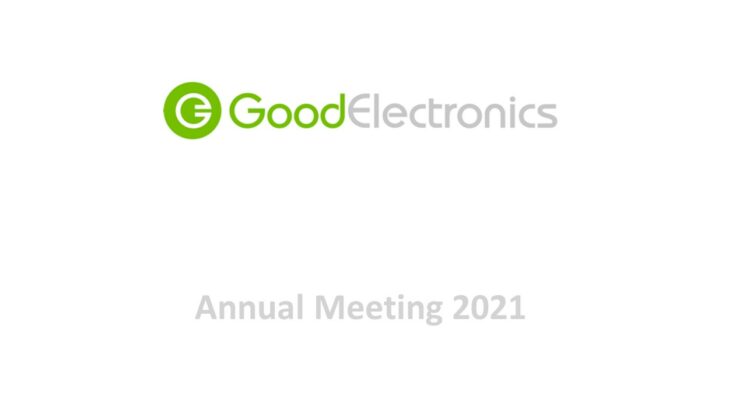GoodElectronics held its annual meeting online on 7 and 9 December 2021, with complementary sessions on 8 and 10 December to cover different time zones. Around 40 member representatives attended the meeting.

Alejandro González (SOMO) and Dina Septi (LIPS) reported on the activities and challenges of the network in 2021. Some of the key activities of the network during the year included support to its members to do research on the impact of Covid-19, e-waste, and outsourcing, develop different sets of training material and organise “train the trainer” workshops for workers and GE members.
Shrinking of civic space
On the first day of the meeting, participants discussed the shrinking of civic space in Asia as an impact of the Covid-19 pandemic and political changes. The network members provided updates on their respective situations and focus of struggle under the pandemic, with many of them facing similar issues.
Members from the Philippines highlighted the current political situation in the country. From 2020, the government has been using military force to kidnap and harass human rights activists. They posed illegal charges against unionists, red-tagging unionists and activists, kidnapping and murdering some of them. Meanwhile, from Hongkong, we heard how the authority revoked the NGO status of many civil society organizations. Since 2020, 50 NGOs had to disband because they were unable to receive funds.
Kan Matsuzaki (Assistant General Secretary, IndustriALL) shared his insights on the global landscape of the electronics industry under the pandemic from a trade union perspective. One of the points raised was that the pandemic sped up digitalisation, leading to an increase in electronics sales. Major big tech companies are making huge investments and profits, while workers in these industries are under a lot of pressure and their factories have a very low union density.
Omana George (Electronics Watch) gave a presentation on the impact of Covid-19 on workers in the electronics sector in Asia based on data collected from 33 workplaces in 7 countries. Across the region workers experienced job loss and reduced hours, shifts towards more precarious work, with health and safety hazards being ignored. Other recurrent issues included leave without pay, fewer workdays but longer hours, and an increase of temporary contract work.
Focus on specific sectors of the supply chain
The second day of the meeting zoomed in on the experiences, plans and strategies around specific issues; mining, manufacturing and workers’ rights, and recycling. In the final session, participants had the chance to share their thoughts on joint actions and priorities for the GoodElectronics network for 2022 and further.
Alejandro González and Irene Schipper (SOMO) presented a new project, titled Promoting human rights and accountability along global battery supply chains (2022-2024).











